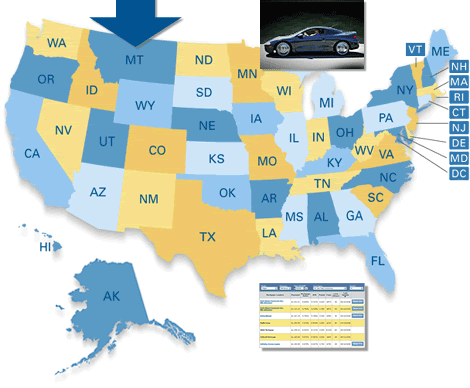Automotive Loans: What to Know About Interest Rates
by Amy Lillard
(1/15/2013) Just as with mortgages and other loans, the interest rate for a car loan ultimately dictates the amount of money you will pay each month and over the life of the loan. That's why it's important to understand how they work and what kind of rates you can obtain.
Overall, interest rates are the cost of borrowing money. Typically interest rates for cars are lower than that for mortgages and bigger property loans, and research online or with a bank will show typical rates available to consumers during the application process. However, interest rates can vary widely depending on a few things:
• Credit. Lenders want to know the risk represented by certain borrowers before extending a loan. They use individuals' credit histories, which show the types of borrowing activity the individual has engaged in and how often bills are paid on time. They also use credit scores based on that history. Generally, the higher the credit score and the better the credit history, the lower interest rate you can earn.
• Debt-to-income ratio. Lenders will examine how much of a borrower's income currently goes towards debts and expenses. They want to ensure a new loan will not stretch a borrower beyond his or her means. If you have a high ratio, you'll probably be charged a higher interest rate due to increased risk.
• Down payment. Spending a larger initial sum in the form of a down payment is a smart move to lower the total amount of the loan. It also lowers the interest rates on the remaining loan, as lenders look favorably on this move.
• Loan Term. Borrowers have more options for the length of a car loan today, with loans lasting up to seven years. But this elongated loan term comes a cost of higher interest rates, and more interest paid over the life of the loan. The shorter the loan, the lower the interest rate.
• Car choice. Finally, the car itself will determine the interest rate you can obtain. Overall, new cars will typically come with lower interest rates. Used car rates will vary much more, due to differing quality of the cars, variable resale value, and changing supply and demand.
Other related articles:
Automotive Loans: Negotiating a Loan with a Dealer
Automotive Loans: Understanding Typical Loan Language
Automotive Loans: Types of Financing
Automotive Loans: Buying Vs Leasing
Automotive Loans: Applying for a Car Loan
Avoid advertised auto trade-in, loan pay-off rip-offs
Auto sales, loans hit the speedway
High MPGs and low auto loan rates can save you thousands of dollars
Research your options when shopping for an auto loan
How to drive a hardauto loan bargain
Special Report: Hitting the Brakes on Auto Dealer Loans
 A frequent contributor to ERATE® since 2006, Amy Lillard is a freelance writer specializing in turning complex information into useful tips and tricks for readers. For questions or topic suggestions, contact Amy at [email protected].
A frequent contributor to ERATE® since 2006, Amy Lillard is a freelance writer specializing in turning complex information into useful tips and tricks for readers. For questions or topic suggestions, contact Amy at [email protected].
New and Used Auto Loan Rates
Choose Your State Below

Start by selecting your state

Amy Lillard
The ERATE® Resource Guide to No-Closing-Cost Refinancing
Principal Reduction: New Programs, More Controversy
Understanding Mortgages: Mortgage Paperwork
Understanding Mortgages: Types of Mortgages
Understanding Mortgages: How to Get a Mortgage
Understanding Mortgages: Buy or Rent?
Understanding Mortgages: Working with a Real Estate Agent
Understanding Mortgages: Working with a Real Estate Agent

Automobile Buying/Financing
5 Steps to Find the Perfect Car
Auto loan defaults to rise 7 percent in 2010
Auto Show Season Tips for Buyers
Consumer Reports suspends recommendations for Toyota's recall models
When is the Best Time to Buy a New Car?
Making a Vehicle Purchase? Enjoy These Helpful Tips
Chances are, your next car will be used. Drive a hard bargain
What your car is really saying
2012 President's Day auto sales among best ever
Special Report: Hitting the Brakes on Auto Dealer Loans
Auto Insurance
Buying Ins - Shopping for Insurance
Best Car Insurance Plan for You


